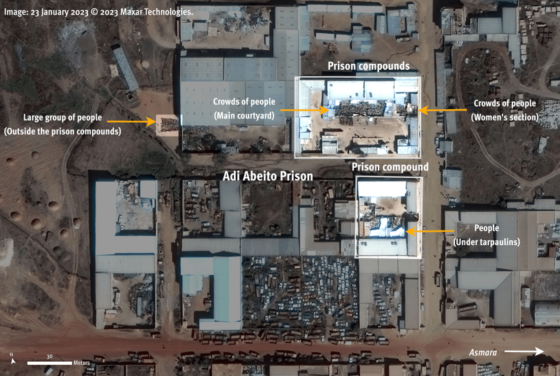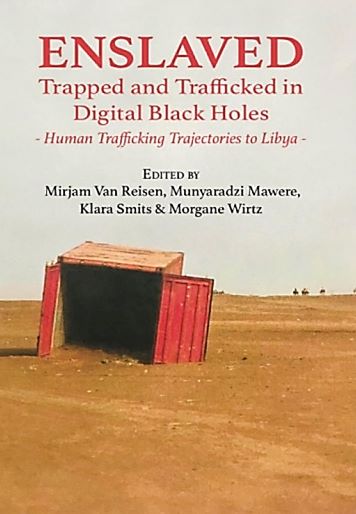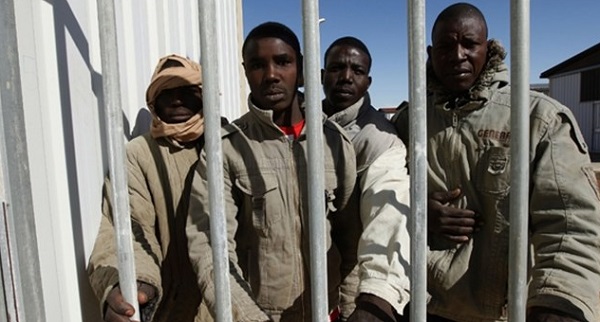|
Eritrea. Liberty Magazine Issue Nr.78
Friday, 03 March 2023 21:22 Written by EPDP Foreign Office AffairsPress Release Eritrean Political Forces (EPF)
Tuesday, 14 February 2023 20:39 Written by Eritrean Political Forces Diplomacy CommitteeEritrea: Crackdown on Draft Evaders’ Families
Thursday, 09 February 2023 22:02 Written by Martin Plaut
|
Eritrean Torture Survivors Lose Appeal for Asylum Status in Israel
Wednesday, 08 February 2023 22:23 Written by Martin Plaut
|
Somalia-Eritrea-Ethiopia: how human trafficking brought 200,000 to Libya and slavery
Wednesday, 08 February 2023 22:13 Written by Martin Plaut
|
Russia reveals its plans for relations with Eritrea
Tuesday, 31 January 2023 21:22 Written by Martin Plaut|
|
Martin Plaut posted: " Lavrov Announces Creation of Framework for Russia-Eritrea Trade Consultations Lavrov: Russia and Eritrea have agreed to create a mechanism for trade consultations MASSAWA (Eritrea), 27 JAN- RIA Novosti Russia and Eritrea have agreed to est" Martin Plaut |
Lavrov Announces Creation of Framework for Russia-Eritrea Trade Consultations Lavrov: Russia and Eritrea have agreed to create a mechanism for trade consultations MASSAWA (Eritrea), 27 JAN- RIA Novosti Russia and Eritrea have agreed to establish an interdepartmental framework for consultations on matters related to trade and economics. According to Russian Minister of Foreign Affairs Sergei Lavrov, both countries will work to insulate their partnership from the ongoing effects of Western sanctions. "We have a mutual interest in developing cooperation in the area of trade and economics. We have agreed to set up a bilateral framework for consultations between the relevant departments that will address economic, trade and investment issues," Lavrov told journalists. He likewise noted that both nations will promote direct contact between their respective business communities "that have shown an interest in pursuing joint projects in the mining industry, energy sector, agricultural sphere and information communication technologies, among others." "Of course, at the same time," the foreign minister concluded, "we will look into what concrete steps can be taken to shield our partnership from illegitimate Western sanctions." |
Eritrea and Russia sign memorandum linking Russia’s naval base with Massawa
Wednesday, 18 January 2023 22:38 Written by Martin Plaut
Citing an announcement by Eritrean Ambassador to Russia Petros Tseggai, state media outlet RIA Novosti reports that the Red Sea port city of Massawa has signed a memorandum of understanding with [Black Sea naval base] Sevastopol. According to Tseggai, an official exchange of delegations is already planned as the two countries seek to develop closer ties. The ambassador likewise noted that he visited Crimea and Sevastopol during the Soviet era and that the peninsula has seen only positive change since returning to Russian control [in 2014]. Eritrea is an East African nation with an agricultural based economy and a growing industrial mining sector. Its capital Asmara enjoys a reputation among tourists as being the safest on the African continent. The RIA Novosti report cited in the above video: Source: 8 January 2023, RIA Novosti) Massawa and Sevastopol Sign Agreement of Cooperation Eritrean Ambassador to Russia Petros Tseggai: Port city Massawa and Sevastopol have signed a memorandum of understanding MOSCOW, 8 JAN- RIA Novosti In an interview [today] with RIA Novosti, Eritrean Ambassador to Russia Petros Tseggai announced that the Eritrean Red Sea port city of Massawa and Sevastopol have signed a memorandum of understanding. In addition, an official exchange of delegations is scheduled. “We have signed a memorandum of understanding between the ports of Massawa and Sevastopol,” Ambassador Tseggai said. “I would like to see something come out of this collaboration.” He noted that an official exchange of delegations is already planned as the two countries seek to develop closer ties. “People in our country have yet to fully appreciate the promise of such a partnership,” the Eritrean diplomat added. “We will have an official exchange of delegations and this will develop.” Ambassador Tseggai said that he visited Crimea during the Soviet era when he was a student in Odessa, and that Sevastopol made an impression on him at that time. “I visited Alushta as a student. Now it (Crimea) has improved a lot. During the Soviet era it wasn’t bad either. I was in Sevastopol, which I'm told was completely destroyed during the Second World War. Both (British Prime Minister Winston) Churchill and others said it wouldn’t be rebuilt even in 70 years,” noted the ambassador. |
How the notorious Eritrean trafficker, Kidane Zekarias Habtemariam, was finally brought to book
Saturday, 14 January 2023 20:48 Written by Martin Plaut
|
|
|
Martin Plaut posted: " There were over 580,000 Eritrean refugees and asylum seekers abroad as of the end 2021, and “the overwhelming majority cited the indefinite national service as the principal reason they fled the country,” according to the May 2022 report of the UN speci" Martin Plaut |
There were over 580,000 Eritrean refugees and asylum seekers abroad as of the end 2021, and “the overwhelming majority cited the indefinite national service as the principal reason they fled the country,” according to the May 2022 report of the UN special rapporteur on the situation of human rights in Eritrea. Source: Human Rights Watch EritreaEvents of 2022 A civilian man who fled violence sits in a bed covered with a mosquito net at the compound of the Agda Hotel, in the city of Semera, Ethiopia, February 17, 2022. © 2022 EDUARDO SOTERAS/AFP 1. Indefinite Military Conscription and Forced Labor 2. Unlawful, Prolonged, and Abusive Detentions Eritrea’s government continued to severely repress its population, imposing restrictions on freedom of expression, opinion, and faith, and restricting independent scrutiny by international monitors. Eritrea continued to negatively impact the rights environment in the Horn of Africa region. Eritrea is a one-man dictatorship under unelected President Isaias Afewerki, with no legislature, no independent civil society organizations or media outlets, and no independent judiciary. In 2001, Isaias closed all independent newspapers and arrested 10 journalists held incommunicado to date. Elections have never been held in the country since it gained independence in 1993, and the government has never implemented the 1997 constitution guaranteeing civil rights and limiting executive power. The government has taken no steps to end its widespread forced labor and conscription, instead, reports of mass roundups (giffas in Tigrinya) and forced conscription to fill the army’s ranks increased in the second half of the year as fighting resumed in Ethiopia’s Tigray region. In September, it reportedly recalled reservists (up to the age of 55) in anticipation of renewed fighting alongside Ethiopian security forces in Tigray. Eritrean forces remained in parts of Ethiopia’s Tigray region where they have continued to commit serious violations, including mass arbitrary detentions, and pillage and rape of Tigrayans in Western Tigray zone. The Africa Centres for Disease Control and Prevention (CDC) did not report any information on vaccination campaigns in Eritrea. Eritrea was re-elected, in late 2021 to the United Nations Human Rights Council on an African group non-competitive slate. However, this did not result in reforms of its oppressive policies, according to the UN special rapporteur on the situation of human rights in Eritrea. Eritrea continued to refuse to cooperate with key UN and African Union rights mechanisms, including by denying access to the UN special rapporteur. In December 2021, it opposed the establishment of a commission of human rights experts on Ethiopia (ICHREE) to investigate abuses by all parties in the Tigray conflict. Eritrea’s 2015 penal code punishes homosexual conduct with five to seven years in prison. Indefinite Military Conscription and Forced LaborThe government continued to conscript Eritreans, mostly men and unmarried women, indefinitely into military or civil service for low pay and with no say in their profession or work location. Conscientious objection is not recognized; it is punished. Discharge from national service is arbitrary and procedures opaque. Conscripts are often subjected to inhuman and degrading punishment, including torture, without recourse. Since Eritrea joined the war in Ethiopia’s Tigray region, new waves of mass roundups of Eritreans believed to be evading service to fill the army’s ranks have been regularly reported, which have included child recruitment according to the UN special rapporteur on Eritrea. Roundups increased in August and September as fighting resumed in Ethiopia; families of draft evaders also faced reprisals, including arbitrary detentions and evictions from their homes. In September, the media said that reservists, men 55 years old and below who had been discharged from the army but were still expected to undergo guard duties, were also being called up. Families are not given official information about the fate of their loved ones sent to fight in Tigray. Conscription begins at the Sawa military camp where students, some as young as 16, are forced to attend their final year of secondary school while undergoing compulsory military training. Students in the camp are under military command, with harsh military punishments and discipline, and female students have reported sexual harassment and exploitation. Dormitories are crowded and health facilities very limited. Unlawful, Prolonged, and Abusive DetentionsThere continued to be widespread mass roundups and prolonged arbitrary arrests and detentions without access to legal counsel, judicial review, or family visits, some for decades, targeting perceived government’s opponents, including draft evaders. Countless prisoners languish in the country’s extensive formal and informal prison network, held in overcrowded places of detention with inadequate food, water, and medical care. Many detainees, including top government officials and journalists arrested in 2001 after they questioned Isaias’s leadership, are held incommunicado. Some are believed to have died in detention. An additional 16 journalists were also arrested at the time. Ciham Ali Abdu, daughter of a former information minister, has been held for 10 years since her arrest at age 15. Former finance minister and critic of the president, Berhane Abrehe, has been in incommunicado detention since September 2018. Freedom of ReligionFor over two decades, the government has denied religious liberty to anyone whose religious affiliation does not match the four denominations that the government “recognizes”: Sunni Islam, Eritrean Orthodox, Roman Catholic, and Evangelical (Lutheran) churches. People affiliated with “unrecognized” faiths continue to be imprisoned, and torture has been used to force them to renounce their religion. The trend of releases that took place in 2020 and 2021 was reversed. People continue to be detained purely because of their religious beliefs. In March, 29 Christians were reportedly detained during a prayer meeting in Asmara and taken to the Mai Serwa prison. Twenty Jehovah Witnesses remained in detention since at least 2014, including Tesfazion Gebremichael, 80, detained since 2011. Between October 11 and 15, the Eritrean government detained three Catholic priests, Abba Abraham Habtom Gebremariam, Father Mihretab Stefanos, and Bishop Abune Fikremariam Hagos. Abune Hagos who was arrested as he returned to Eritrea from Italy, had in 2019 penned, along with three other bishops, a pastoral letter obliquely calling for justice and reform. In February, Abune Antonios, the deposed Eritrean Orthodox Church patriarch, died while under house arrest, to which he had been subjected since 2006. The government continued to take control of schools and other institutions run by the Catholic church. In August, media reported that the government planned to take over two Catholic-run vocational training centers. Some peaceful protesters arrested in 2017 and early 2018 for protesting the government takeover of Al Diaa Islamic school, remained in detention. Refugees and ReturneesEritrea is not a party to the 1951 UN Refugee Convention and has not ratified the 1969 African Refugee Convention. There were over 580,000 Eritrean refugees and asylum seekers abroad as of the end 2021, and “the overwhelming majority cited the indefinite national service as the principal reason they fled the country,” according to the May 2022 report of the UN special rapporteur on the situation of human rights in Eritrea. Eritreans seeking protection abroad have been targeted for abuses by Eritrean authorities and security forces, both while abroad (in Ethiopia), and after forced returns from other countries, such as Egypt. Since the outbreak of conflict in Tigray in November 2020, warring parties, including Eritrean forces, have subjected Eritrean refugees to serious abuses. In January, the UN reported that a January air strike near the Mai Aini camp in Tigray region killed three Eritrean refugees, two of them children. Humanitarian access and basic services to the 25,000 Eritrean refugees living in two remaining camps in Tigray has been affected by fighting, an uptick in drone strikes, and the Ethiopian government’s effective siege on the Tigray region. In January, the UN reported 20 preventable deaths there due to lack of medicine and health services. Nongovernmental organizations and UN rights experts raised concerns that the effective siege and impunity for conflict-related abuses was contributing to Eritrean refugee women’s vulnerability to sexual violence and exploitation. In March 2022, Egypt forcibly returned 31 Eritrean refugees and threatened additional repatriations; in December 2021 it had deported 24 Eritrean refugees, including children. In Sudan’s capital, Khartoum, for several months, undocumented Eritreans were reportedly arbitrarily detained and released after paying significant sums. In April , UN human rights experts cited “patterns of human rights violations against Eritreans who have been forcibly returned” to Eritrea, including torture, ill-treatment, enforced disappearance, and arbitrary detention. They stated that some Eritreans, deported by Egypt in October 2021, had not been seen or heard from since and were believed to be held in incommunicado detention by Eritrean authorities. Key International ActorsIn January, the UN launched a new development cooperation framework with Eritrea, sending a high-level delegation to Asmara. In March, Eritrea voted against a UN general assembly resolution condemning Russia’s invasion of Ukraine, one of only five countries (including Russia) to do so. President Isaias later defended Russia in an annual Independence Day speech. He reportedly invited Russia to establish a naval base on its Red Sea Coast. In its concluding observations on Eritrea, in April, the African Committee of Experts on the Rights and Welfare of the Child (ACERWC) noted that by not affording children the right to freedom of religion, Eritrea had violated the provisions of the African Charter on the Rights and Welfare of the Child. The committee recommended that Eritrea, referring to the final year of schooling in the Sawa military camp, should ensure that children are not educated in a militaristic environment, revise its policy recognizing only four religions, the law prohibiting independent local media platforms, take legislative measures to explicitly outlaw the use of corporal punishment, and authorize the committee to conduct a fact-finding mission to investigate allegations of child military training in the Sawa camp. In September, US President Joe Biden extended, for one year, the ability to sanction Eritrean officials for committing serious human rights abuses in Tigray. The European Union maintained individual sanctions on Maj. Gen. Abraha Kassa, head of Eritrea’s national security agency, which it rolled out in March 2021, for serious human rights abuses in Eritrea including killings, arbitrary arrests, enforced disappearances, and torture. In September, the US condemned Eritrea’s re-entry into the conflict. In July, Somalia’s new president visited Somali troops being trained in Eritrea, reversing his predecessor’s denials that any were there. |





























